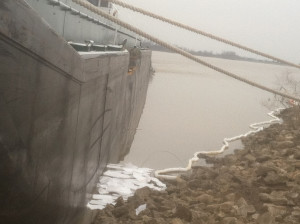We have much more to do and your continued support is needed now more than ever.
New Oil Spill Fouls Mississippi River
On Sunday, an oil barge travelling down the Mississippi River collided with a tugboat, spilling more than 31,000 gallons. Thankfully no one was hurt, but a 65-mile stretch of the river, and the entire port of New Orleans, had to be closed while crews raced to contain the spill. Wildlife impacts are as yet unknown.
Officials don’t know how much oil spilled, but only a sheen was reported on the river following the collision, which happened Saturday afternoon near Vacherie, 47 miles west of New Orleans by land, said Coast Guard Petty Officer Bill Colclough.
No one was hurt and all barges were secured, Colclough said. The cause of the collision was under investigation.
2013 was a historically awful year for train disasters, with more oil spilled in just one year than in the nearly four decades since the federal government began collecting data on these spills. Yesterday’s accident reminds of us the dangers inherent in oil transportation on our nation’s rivers as well.

While the oil and gas industry likes to paint spills like this as an aberration, the National Wildlife Federation has documented that oil and gas disasters are very common.
Not only does this speak to our need to ensure that our safety measures are as good as they can possibly be, but it points towards the only long term solution. When need to move away from oil and other fossil fuels, we can reduce the number of oil carrying barges that might fall prey to a collision. By treating our addiction to fossil fuels like oil, we can ensure we have a safer, healthier planet in the long term.
![]() Tell the EPA for the sake of polar bears and all other animals, it’s time to put stronger limits on the pollutions from fossil fuels!
Tell the EPA for the sake of polar bears and all other animals, it’s time to put stronger limits on the pollutions from fossil fuels!





















